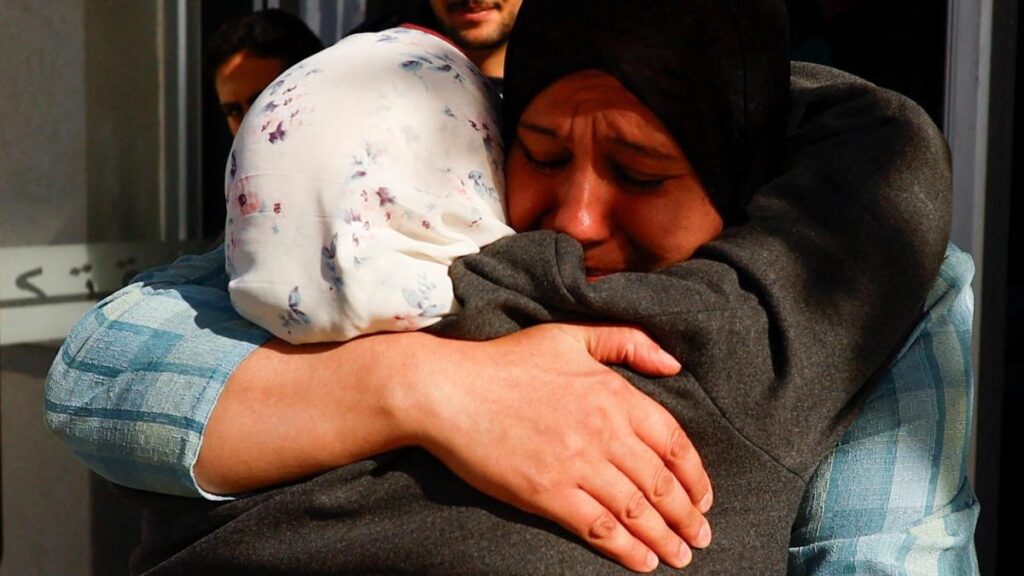It’s been ten months since my family escaped from Gaza, yet the shadows of loss, trauma, and the war linger with us, burdening our everyday existence. This month, just before the anniversary of the conflict, we experienced one of the most harrowing episodes since our departure. A video message from my wife’s cousin, caught in the chaos of war, relayed a desperate plea: “The tanks are surrounding us and firing at us. These could be the last moments of our lives.” The stark urgency of her words sent my wife into a spiral of despair, knowing that her uncle, aunts, and their families—26 individuals in total—were under severe bombardment. The violence was relentless, and when a voice note finally came through, it revealed grave injuries among her family members. Despite frantic attempts to reach help through organizations like the Red Cross, the conditions on the ground were devastating. The Israeli military allowed for a late evacuation, but it was too late for Wafaa, who succumbed to her injuries shortly after arrival at the hospital.
Deeply rooted in my anguish is a sense of guilt about my newfound safety in Istanbul, where I live with my wife and two children. While my father endures grim living conditions in a tent in Khan Younis, which has recently faced renewed bombings, many of us who have fled Gaza grapple with the emotional scars left behind. This displacement phenomenon isn’t unique to my family; countless others have sought refuge across various nations—Turkey, Egypt, parts of Europe, and beyond. Tragically, the journey to escape isn’t accessible for everyone; many remain trapped in Gaza, unable to afford the exorbitant costs associated with safely leaving. In Egypt alone, over 100,000 Gazans have crossed the border since November, finding a temporary reprieve from airstrikes yet facing their new battles of survival.
Newly arrived refugees in Cairo congregate in lively cafés, trying to retain a semblance of normalcy while reminiscing about their homeland. Amid the bustling atmosphere, one can overhear the strains of traditional Palestinian songs, evoking nostalgia and longing. Many of these individuals compare their harrowing experiences and offer support to one another as they navigate their new environments. Among them is Abu Anas Ayyad, a former successful businessman from Gaza, who recounts his past and the ache of watching his homeland endure relentless destruction. He openly expresses resentment towards Hamas and its handling of the conflict, declaring that while his love for Gaza remains strong, he cannot consider returning while the group remains in control.
Nearby, Mahmoud Al Khozondr, who had previously owned a beloved hummus restaurant, reflects on the stark realities of post-war life. The loss of his former home and lifestyle now demands a painful adaptation to cramped living conditions in Egypt without access to education for his children. Mahmoud’s story is echoed by others who share his struggle, as they attempt to reassemble their lives amid feelings of grief and displacement. The emotional toll of their loss is coupled with logistical hardships; lack of proper residency status in Egypt means that services, including education and employment opportunities, remain out of reach for many Gazans.
As I survey the atmosphere, it becomes glaringly evident that financial support from abroad has become a lifeline for many families still in Gaza. Yet, that support is hampered by steep remittance fees and unscrupulous middlemen aiming to profit from the suffering. Mahmoud Saqr, a former electronics store owner, illustrates the desperation of the process: cash transactions conducted without receipts or assurances of security. This grim reality deepens the sense of helplessness among refugees who find themselves caught in a cycle of needing to support loved ones while also struggling to carve out stability in their new environment.
Life in Turkey has been a fragile balance of attempting normalcy while constantly tethered to memories of home. Each day, my children express their yearning for the familiarity of Gaza—their favorite restaurants, spacious home, and friendships left behind. The fact that some of their classmates lost their lives during the ongoing violence adds weight to our sorrow, making it hard to shake the feeling of trauma despite our physical escape. Since the disastrous events of October 7, a sense of time has stagnated, preventing us from moving ahead and finding closure. While our bodies may have left Gaza, our hearts remain entwined with the ongoing struggles faced by those we left behind, creating an enduring emotional burden that we all carry.

